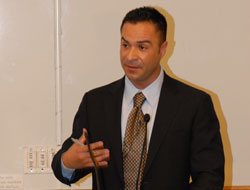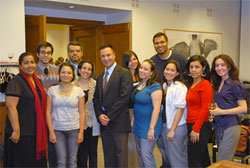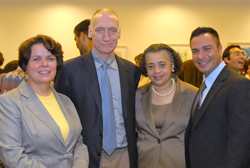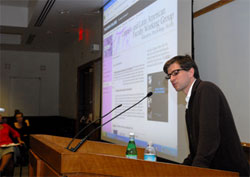Education as a Tool for Breaking the Cycles of Poverty
Gates Foundation official tells TC audience that philanthropy plans to bolster the number of low-income students earning postsecondary credentials
The Bill & Melinda Gates Foundation is known for its impact, but here’s a goal that’s ambitious even by its standards: doubling by 2025 the percentage of low-income young people, especially minority youth, who earn a postsecondary degree or credential.
“Over the last 30 years, this country has succeeded in dramatically expanding access to higher education, but we have never set our sights on improving completion, especially for low-income, first-generation students, whose lives can be transformed by achieving this part of the American dream,” Gates Senior Program Officer Gilberto Conchas told a packed audience at Grace Dodge Hall on November 13th. “These young adults will be the leaders in one of the most challenging times in our country’s history, and transforming opportunity for them will transform opportunity for us.
The Foundation has “no illusions about the difficulty of achieving the goal we have established,” said Conchas, an associate professor with joint appointments in Chicano/Latino Studies and Sociology in the Department of Education at the University of California, Irvine who himself is the son of Mexican immigrant farm workers. “But we are optimistic of our ability to achieve success even in this time of economic crisis and uncertainty. These are very tough times, and I know many institutions face the prospects of budget cuts and many communities are hurting, but the nation performs at its best when it is under the most pressure. Tough times often focus us to innovate, to think differently about problems and to reshape what we think of ourselves, our institutions and of each other.”
According to Gates Foundation statistics, less than a third of young adults from poor families earn any kind of postsecondary credential. The Foundation intends to boost that figure to 60 percent, which would mean an increase of more than 250,000 graduates per year.
Conchas’ presentation was sponsored by the Latina/o and Latin American Education Faculty Working Group at Teachers College and the Center for the Study of Ethnicity and Race at
The Gates Foundation has had a major presence in K–12 education for years, funding small school and other initiatives in
The research process was extensive. Program officers met with leading practitioners and scholars, including Thomas Bailey, TC’s George and Abby O’Neill Professor of Economics and Education and Director of both the
Conchas outlined three reasons for that decision. The first was that research shows that education, particularly postsecondary education, is the best way to help young people get good jobs and maintain stable, productive lives. Moreover, the benefits appear to extend to future generations. “Education creates a multigenerational cycle of prosperity powerful enough to push aside cycles of poverty.”
Second, an advanced education will become more essential as society grows more complex. Conchas said that in the future more than half of all new jobs will require at least some college. If educational attainment does not keep pace, the consequences for the country could be dire.
Finally, an expanded investment to include postsecondary education builds on an already strong foundation presence in K–12 schools. Given that involvement, Conchas said the foundation is confident it can eventually make a difference.
The foundation will focus on ages 16 to 26. Getting students to complete their academic programs by age 26 is crucial, Conchas said, because research indicates that if a credential has not been attained by then, the likelihood of completing one decreases substantially.
Key to the success of the foundation’s plan, he said, will be community colleges. These tend to be the institutions of choice for millions of people who would otherwise have no access to higher education. They are easily accessible to potential students, and he said they often cost a fifth of their private, for-profit counterparts.
In addition, the economic benefits of an associate of arts degree, which can be obtained at a community college, are substantial, adding up to hundreds of thousands of dollars of income earned over the course of a lifetime compared to earnings with a high school diploma. “Community colleges cannot achieve this goal alone, but they may be our most important partner,” he said.
Conchas’s visit was the first event hosted by the Latina/o and Latin American Education Faculty Working Group. The group currently numbers 16 faculty members and administrators and five doctoral students. In establishing the group and launching the Web site, Regina Cortina, Associate Professor of Education in the Department of International and Transcultural Studies, says the goal is to showcase the extensive research and outreach work being done by TC faculty and make it readily accessible to scholars and students at
“When I came to Teachers College last September and typed in Latino on our Web site, the only thing that showed up was a Web site that was from 2004, and I said, ‘That’s not going to work,’” said Cortina of the decision to develop the site.
Published Friday, Nov. 21, 2008



